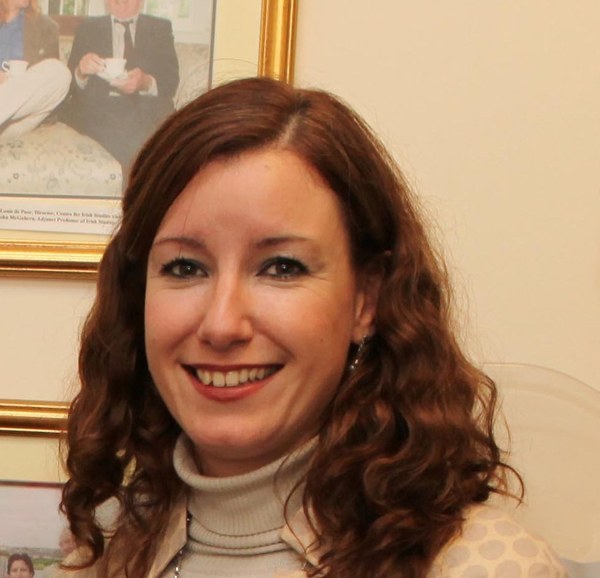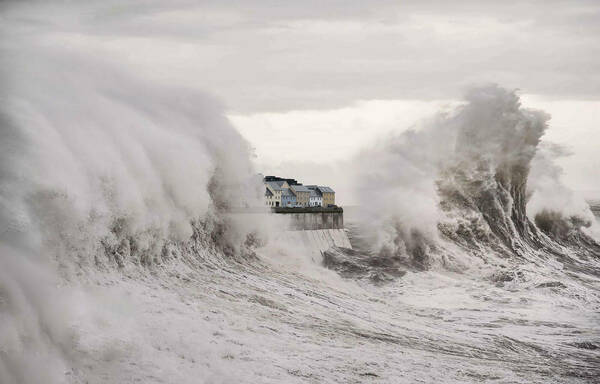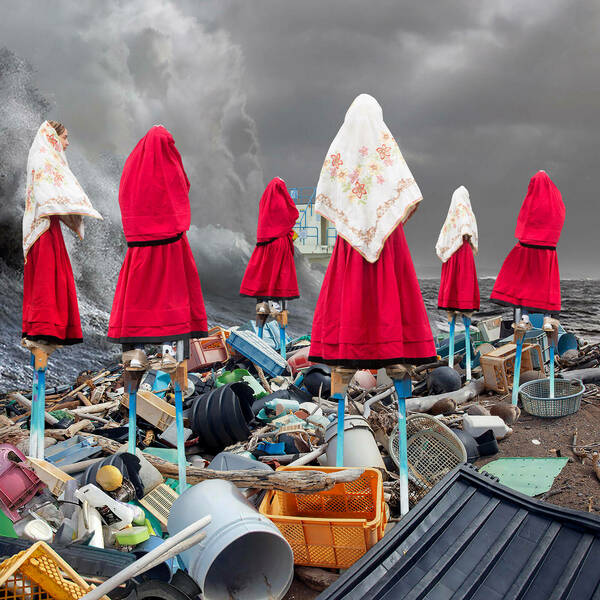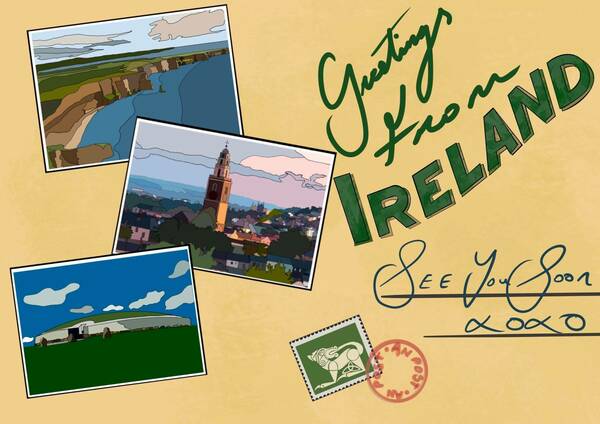
Dr. Nessa Cronin is Lecturer in Irish Studies at the Centre for Irish Studies and Associate Director of the Moore Institute for Research in the Humanities and Social Studies at NUI Galway.
Dr. Cronin has published widely on various aspects of Irish literature, cultural geography, and the environmental humanities. In September 2019, she was elected to the National Committee of Future Earth Ireland, based at the Royal Irish Academy, Dublin. Just this spring, in recognition of her dedication to students during the pandemic and her innovative teaching methods, she was nominated for NUI Galway’s President’s Teaching Award.
She visited the Keough-Naughton Institute for Irish Studies in Spring 2019 and gave a memorable lecture to a packed lecture theatre on "Climate Crisis and Irish Environmentalities in the Capitalocene." Since then she has liaised with students from the Notre Dame Environmental Change Institute and also contributed to the graduate IRISH Seminar this past summer with her discussion on Irish Environmental Humanities.
Early in the pandemic, the Institute re-published her commentary on the website of the Irish Humanities Alliance that explored how the pandemic would change “the very fabric of our daily lives as global citizens” and advocated for a collaborative internationalist approach that required “a hive mind, not a herd mentality.”
From Galway, she answers our Three Questions.
What are you working on?
I’m currently working on developing ideas and arguments I discussed initially in my Notre Dame 2019 lecture and later put forward in my contribution to the Routledge International Handbook of Irish Studies entitled, ‘Environmentalities’. The key argument is that the climate and biodiversity crises are not about the environment per se, but rather that the core issue is the way in which we (in the west in particular) ontologically, ethically and politically relate to our environment. It’s the meon aigne that’s the problem as much as anything else.

My current writing explores how we need to be particularly attendant to the languages of the climate and biodiversity crises, and that we have a lot to learn from the bilingual Irish context when looked at on continental and planetary scales. I hope it will be an extension of arguments that Michael Cronin has made so well in his books Eco-Translation and An Ghaeilge agus an Éiceolaíocht. This will form part of the first volume of a new book series, Earth Writings, that I’m currently co-writing with my colleagues Professor Karen E. Till and Professor Gerry Kearns from Geography at Maynooth University. The series will be published by Cork University Press, and as an international, interdisciplinary short book series that seeks to examine different and alternative ways of thinking about our environments by gathering conversations and expert voices from across the arts and sciences, while learning from community programmes and activism to help shape a more inclusive public dialogue for the existential question of our time.

On a more practical note, I’m also working on my animal husbandry skills (is there an animal ‘wifery’ lexicon I need to draw upon I wonder?!), as we got five chickens before the first lockdown in Ireland, and am trying to channel Thomas Kinsella’s ‘Hen Woman’ amongst other things while encouraging them to be consistently happy hens (i.e. lay eggs in the same spot everyday!). ‘Lay or pray!’ is the mantra in our house at the moment.
What are you reading?
Like many people, I found reading during the dark days of the pandemic very difficult and switched to reading poetry when my mind was spinning with the daily pandemic statistics—Michael Coady’s One Another I can’t recommend highly enough, along with Moya Cannon’s Donegal Tarantella which was dedicated to Tim and Mairéad Robinson, both of whom passed away last year. I just finished Úna-Minh Kavanagh’s Anseo, which I’m going to put on to my First Year reading list straightaway—a wonderful book on growing up in West Kerry as a native Irish speaker while also honouring her Vietnamese heritage. The chapters in which she discusses how she deals with racism in Ireland as a young woman and journalist are instructive for us all to talk about and consider, so we can all make Ireland a more inclusive country for everyone. I also happily discovered the wonderful Rabbit and Bear book series by Julian Gough, which my two children adore, but I think I’m Julian’s biggest fan!
I’m currently reading Richard Kearney’s Touch, which was presciently written pre-pandemic but has a covid ‘coda’ to the volume. The importance of the body, and the knowledge that’s contained or denied therein, is something that feminist and indigenous scholars have known for many years, and the European philosophical tradition has had to deal with the hangover from Plato and his ‘figures in the cave’ for too long now. Kearney’s writing opens up the history and legacy associated with the resulting rejection of ‘touch’ and somatic knowledges, and offers profound ways of thinking through how we need to recalibrate ourselves with this with the increasing dominance of technology in our lives as well now too.
I re-read Seamus Deane’s Strange Country for a SOFEIR plenary ‘From Crisis to Care: Strange Countries and Shared Planetary Futures’ I was working on earlier this summer, and was once again struck with Deane’s finely tuned insights and was very grateful to be reminded why good scholarship matters. I have his Small World currently on my desk and look forward to reading that once the autumn nights set in here in the west of Ireland.
What, during the pandemic, are you missing?
From a personal perspective I missed very much not being able to travel ‘home home’ to Cork at different stages over the last 18 months. The past summer was wonderful in that we were above to travel and visit family and friends across the country again, and we realised all the more how we missed the hugs, the human contact, and just being with those that we love in these extraordinary times.
As an educator, I really missed being in the classroom and face-to-face teaching and conversations with my students. The tech ‘pivot’ to zoom and other digital platforms was stressful and challenging for many of us (staff and students alike) where tech support, broadband or wifi access was wobbly or non-existent. I did a letter writing project with my students where we teamed up with Nursing Homes Ireland last year to write to all the nursing homes in Galway city and county for Christmas, as the residents were not allowed have visitors for fear of infection, and again it just showed why words and writing matter. [LINK to the RTÉ clip "NUI Galway: Words of Comfort] We are all very happy to get back to in person and on campus activities this semester, and hope to see you all at the Centre for Irish Studies at NUI Galway again sometime soon!
Directed by Ríonach Ní Néill. https://galway2020.ie/en/event/drowned-galway/
Below: ‘Greetings from Ireland - See You Soon’, Liz Buckley (2020). Reproduced with kind permission
